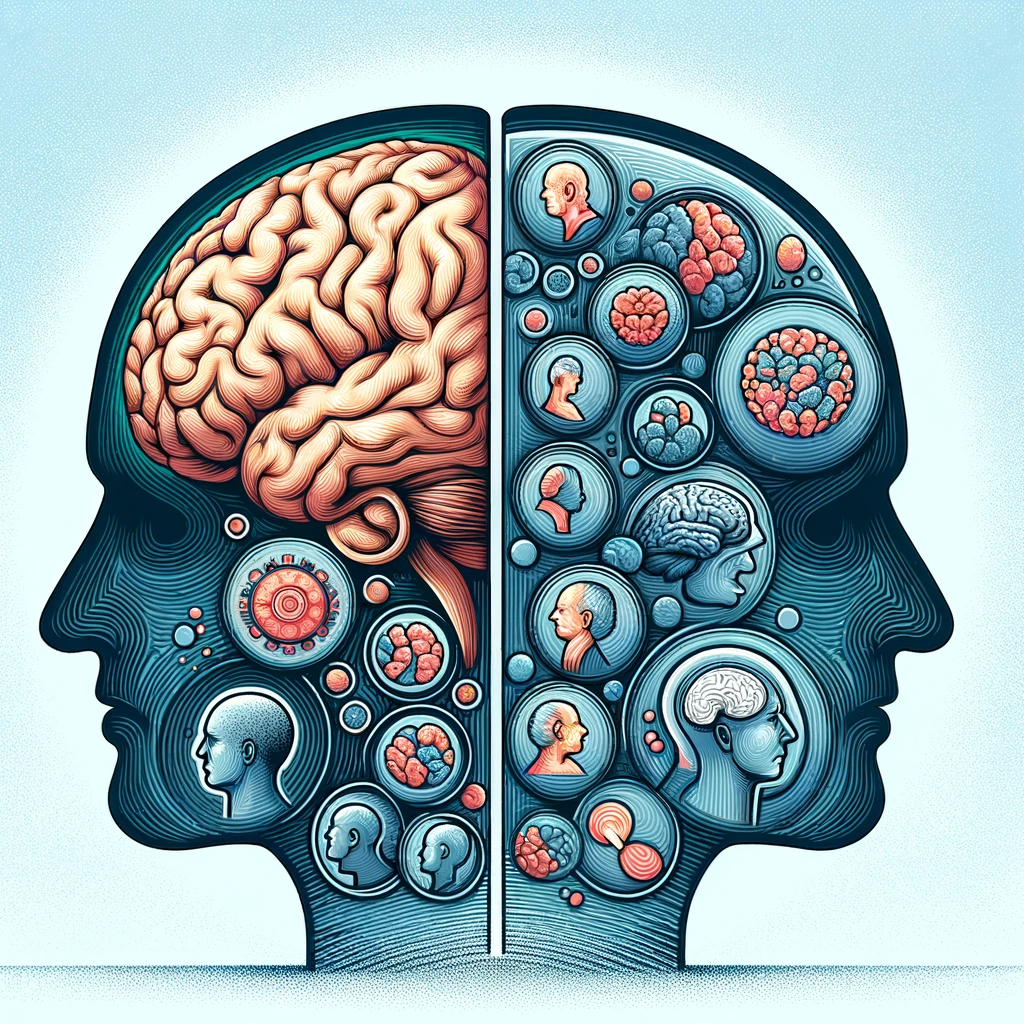Understanding Alzheimer's and Dementia: Differences, Stages, and Symptoms
This comprehensive guide explores Alzheimer's and dementia, highlighting key differences and similarities, the importance of early detection, and effective management strategies. It offers insights into symptoms, progression, and care approaches

Decoding Dementia and Alzheimer's: A Comprehensive Guide
Dementia and Alzheimer's disease, often used interchangeably, are distinct medical conditions that impact millions worldwide. Dementia serves as an umbrella term for a set of symptoms that include impaired thinking, memory, and reasoning. Alzheimer's disease, on the other hand, is the most common cause of dementia, accounting for 60-80% of cases.
Understanding the distinction between dementia and Alzheimer's is crucial for several reasons. Firstly, it helps in accurate diagnosis and treatment. While Alzheimer's is irreversible and progressively worsens, other types of dementia might be caused by treatable conditions. Secondly, this understanding aids families and caregivers in managing expectations and planning care. Recognizing that not all memory loss or cognitive decline is Alzheimer's can alleviate unnecessary fear and facilitate targeted medical attention.
In conclusion, a clear grasp of the differences between dementia and Alzheimer's can significantly improve the quality of care and support provided to those affected. This guide aims to unravel the relationship between the two, clarify common misconceptions, and provide a deeper understanding of these complex conditions.
Understanding Dementia and Alzheimer's Disease
Definition of Dementia and Alzheimer's
Dementia is not a single disease but a general term that describes a wide range of symptoms associated with a decline in memory or other thinking skills severe enough to reduce a person's ability to perform everyday activities. Alzheimer's disease is the most common cause of dementia among older adults. It is characterized by symptoms that involve gradual memory loss, confusion, and difficulty with problem-solving and language.
"Dementia vs Alzheimer's": Explaining the Relationship
The relationship between dementia and Alzheimer's can be understood by comparing it to the relationship between fruit and apples. Dementia is like fruit, a general category, while Alzheimer's disease is like an apple, a specific type of fruit. Alzheimer's is a specific disease that falls under the dementia umbrella. Therefore, while everyone with Alzheimer's has dementia, not everyone with dementia has Alzheimer's.
"What is Alzheimer's and Dementia": Clarifying Misconceptions
There are several misconceptions about Alzheimer's and dementia that need to be clarified. Firstly, dementia is often mistakenly believed to be a part of normal aging. While age is the strongest known risk factor for dementia, it is not a normal part of aging. Secondly, Alzheimer's disease is often thought to affect only memory, but it also impacts other cognitive and functional abilities. Finally, many believe that Alzheimer's and other dementias are completely hereditary, whereas genetics plays a role, but other factors like lifestyle and environmental conditions also significantly contribute.
Understanding the differences and connections between dementia and Alzheimer's is critical for proper diagnosis, treatment, and care planning. This knowledge dispels common myths and provides a clearer picture of these complex conditions.
Alzheimer's Disease: A Closer Look
Alzheimer's disease represents a specific and prevalent form of dementia. It's crucial to delve deeper into understanding this condition for better diagnosis, treatment, and care.
Alzheimer's Disease Explained
Alzheimer's disease is a progressive neurological disorder that causes the brain to shrink (atrophy) and brain cells to die. It is the most common cause of dementia — a continuous decline in thinking, behavioral, and social skills that disrupts a person's ability to function independently.
Understanding the Alzheimer's-Dementia Relationship: An Analogy
To clarify the relationship between Alzheimer's and dementia, consider this analogy: "Alzheimer's disease is to dementia as a square is to a rectangle." Just as a square is a specific type of rectangle, Alzheimer's is a specific type of dementia. However, not all rectangles are squares, just as not all dementia cases are Alzheimer's.
Early Signs and Symptoms
Early signs of Alzheimer's include difficulty remembering recent conversations or events, apathy and depression, impaired judgment, disorientation, confusion, behavioral changes, and difficulty speaking, swallowing, and walking.
Progression of Alzheimer's
Alzheimer's disease progresses through several stages, from mild Alzheimer's (early-stage) to moderate and eventually severe Alzheimer's (late-stage). As Alzheimer's advances, symptoms become more pronounced and debilitating.
Risk Factors and Causes
Age is the most significant known risk factor for Alzheimer's. Other factors include family history, genetics, and certain lifestyle and environmental factors.
Diagnosis and Treatment
There's no single test for Alzheimer's. Diagnosis involves a thorough medical assessment, including medical history, mental status testing, physical and neurological exam, and tests (blood tests, brain imaging) to rule out other causes of dementia symptoms.
Living with Alzheimer's
Coping with Alzheimer's disease is challenging for both patients and caregivers. It involves managing symptoms, adapting living environments, ensuring safety, and providing supportive care.
Understanding Alzheimer's disease in detail helps in recognizing the signs early, seeking appropriate care, and making necessary preparations for the journey ahead. It's a crucial part of the broader context of dementia care and awareness.
Understanding the Stages of Alzheimer's and Dementia
Introduction
Understanding the progression of Alzheimer's and dementia is crucial for effective care and management. These conditions evolve in stages, each marked by distinct symptoms and care needs.
The Stages of Alzheimer's Disease
"Dementia or Alzheimer's Stages" typically involves three key phases: early, middle, and late stages.
- Early Stage
- Mild memory loss, like forgetting names or misplacing objects.
- Subtle changes in personality and mood.
- Challenges in planning or organizing tasks.
- Middle Stage
- Increased memory loss, including forgetting recent events or personal history.
- Confusion about time and place.
- Difficulty with daily tasks and self-care.
- Changes in sleep patterns.
- Increased risk of wandering.
- Late Stage
- Severe memory loss, with individuals often unable to communicate effectively.
- Significant personality changes and potential behavioral issues.
- Dependence on caregivers for daily activities.
- Physical symptoms like difficulty walking or sitting.
Recognizing these stages helps in tailoring care and support to the individual’s evolving needs, ensuring both physical and emotional well-being.
Key Characteristics of Each Stage of Alzheimer's Disease
Alzheimer's disease, a progressive neurological disorder, unfolds in distinct stages, each with its own set of challenges and symptoms. Understanding these stages is crucial for providing appropriate care and support.
- Early Stage of Alzheimer's
- Symptoms: This stage is characterized by mild symptoms that may include forgetfulness (especially of recent events or conversations), difficulty with names or words, losing or misplacing items, and challenges in planning or organizing.
- Impact on Daily Life: Individuals may still manage personal care and routine tasks but might experience difficulties at work or in social settings.
- Communication Abilities: Slight difficulty in finding the right words but can generally communicate effectively.
- Middle Stage of Alzheimer's
- Symptoms: Memory loss becomes more prominent. Individuals may forget personal history or significant events, experience confusion about time or place, and show mood or personality changes, such as withdrawal or suspicion.
- Impact on Daily Life: Increasing dependence on others for daily tasks. Challenges in recognizing family and friends, managing finances, or navigating familiar environments.
- Communication Abilities: Progressive difficulty in organizing thoughts and expressing themselves. Repetition of conversations or questions is common.
- Late Stage of Alzheimer's
- Symptoms: Severe memory loss is evident, and individuals may lose the ability to communicate coherently. There’s a need for full-time assistance with personal care.
- Impact on Daily Life: Complete reliance on caregivers for daily activities. Individuals may experience physical difficulties, such as trouble walking or sitting.
- Communication Abilities: Significantly impaired. Might communicate pain or discomfort through behavior rather than speech.
Signs and Symptoms of Alzheimer's Dementia
- Early Warning Signs: Include not only memory lapses but also subtle changes in mood, such as increased anxiety or agitation, especially in challenging situations.
- Progressive Symptoms: As Alzheimer's progresses, symptoms extend beyond memory to include disorientation (losing track of dates, seasons, and the passage of time), difficulties with speaking or writing, and decreased judgment and decision-making ability.
In conclusion, each stage of Alzheimer's presents unique challenges that affect daily life and communication abilities. Understanding these stages aids caregivers in providing appropriate and compassionate care, adjusting as the disease progresses.
Alzheimer's Disease and Personality Changes
Symptoms and Signs of Alzheimer's and Dementia
Alzheimer's disease, a common form of dementia, manifests through various symptoms that progress over time. Understanding these signs is crucial for early diagnosis and intervention.
Early Warning Signs of Alzheimer's Dementia
- Memory Loss: Difficulty remembering newly learned information is often the first sign. This includes forgetting important dates or events, asking for the same information repeatedly, and increasingly needing memory aids.
- Challenges in Planning or Problem Solving: Some people may experience changes in their ability to develop and follow a plan or work with numbers.
- Difficulty Completing Familiar Tasks: There might be trouble driving to a familiar location, managing a budget, or remembering the rules of a favorite game.
- Confusion with Time or Place: Losing track of dates, seasons, and the passage of time is common. They may have trouble understanding something if it's not happening immediately.
- Trouble Understanding Visual Images and Spatial Relationships: Vision problems can be a sign of Alzheimer's. This may lead to difficulty with balance or trouble reading.
- New Problems with Words in Speaking or Writing: People with Alzheimer's may have trouble following or joining a conversation.
Progressive Symptoms
- Misplacing Things and Losing the Ability to Retrace Steps: A person with Alzheimer's may put things in unusual places. They may lose things and be unable to go back over their steps to find them.
- Decreased or Poor Judgment: Changes in judgment or decision-making can occur. This might involve using poor judgment when dealing with money or paying less attention to grooming or cleanliness.
- Withdrawal from Work or Social Activities: A person with Alzheimer's may start to remove themselves from hobbies, social activities, work projects, or sports.
- Changes in Mood and Personality: The mood and personalities of people with Alzheimer's can change. They can become confused, suspicious, depressed, fearful, or anxious.
Comparing Symptoms with Other Dementia Types
- Vascular Dementia: Often characterized by impaired judgment or the ability to make decisions, plan, or organize, rather than memory loss.
- Lewy Body Dementia: Includes symptoms like visual hallucinations and muscle rigidity along with memory loss.
- Frontotemporal Dementia: Typically involves drastic personality changes, behavioral shifts, and difficulty with speech.
In conclusion, understanding these symptoms is vital for early detection and treatment. While there are overlaps with other dementia types, certain symptoms are more pronounced or unique in Alzheimer's disease, aiding in its differentiation and management.
Diagnosis and Management of Alzheimer's and Dementia
Diagnosing and managing Alzheimer's and dementia are critical aspects of care that require a multi-faceted approach. Understanding how these conditions are diagnosed and the current management strategies is key for patients, caregivers, and healthcare providers.
Diagnosis of Alzheimer's and Dementia
- Medical History and Physical Examination: The process begins with a thorough medical history and physical examination. Doctors review the patient's medical history, including symptoms, past medical problems, family history, and current medications.
- Cognitive and Neuropsychological Tests: These tests assess memory, problem-solving, attention, counting, and language skills.
- Brain Imaging: Techniques like magnetic resonance imaging (MRI) or computed tomography (CT) scans are used to rule out other conditions that may cause symptoms similar to Alzheimer's but are treatable.
- Biomarker Tests: Recent advancements include biomarker tests that detect beta-amyloid and tau proteins in the brain, hallmarks of Alzheimer's disease.
Managing Alzheimer's Disease
- Medications: Current medications for Alzheimer's include cholinesterase inhibitors (Aricept, Exelon, Razadyne) and memantine (Namenda). These drugs help manage symptoms but do not cure Alzheimer's.
- Lifestyle and Home Remedies: Regular exercise, a healthy diet, social interaction, and mentally stimulating activities can help manage symptoms.
- Cognitive Stimulation Therapy: Activities and exercises aimed at improving memory, problem-solving skills, and language ability.
- Support and Counseling: Counseling for individuals with Alzheimer's and their families is crucial to manage the emotional aspects of the disease.
Managing Other Types of Dementia
- Vascular Dementia: Management includes controlling risk factors for further brain damage due to blood vessel issues, like controlling blood pressure, cholesterol levels, and diabetes.
- Lewy Body Dementia: Treatment includes medications to address symptoms like movement problems or hallucinations.
- Frontotemporal Dementia: Management focuses on behavior modification, speech therapy, and medications to manage symptoms.
While there is no cure for Alzheimer's and most types of dementia, early diagnosis and a comprehensive management plan can help improve quality of life. Advancements in diagnostic techniques and ongoing research offer hope for more effective treatments in the future.
Navigating the Complexities of Alzheimer's and Dementia
In summarizing, it's clear that Alzheimer's and dementia are interconnected yet distinct. Alzheimer's, a specific type of dementia, is marked by its unique progression and symptomatology. Understanding these differences is crucial for accurate diagnosis and effective care.
The similarities in these conditions lie in their impact on cognitive functions, affecting memory, problem-solving abilities, and daily living skills. However, the way these symptoms manifest can vary significantly, particularly in the early stages.
Early detection of Alzheimer's and other dementia types is vital. It allows for timely intervention, which can significantly improve quality of life and provide opportunities for patients and families to plan for the future. Care strategies should be personalized, considering the specific needs and progression of the condition in each individual.
Effective management of Alzheimer's and dementia involves a combination of medication, lifestyle modifications, support, and therapy. Each plays a crucial role in addressing the multifaceted challenges these conditions present.
In conclusion, understanding the nuances of Alzheimer's and dementia equips caregivers and healthcare professionals to provide better care, ultimately enhancing the lives of those affected by these conditions. The journey with dementia and Alzheimer's is undoubtedly challenging, but with the right knowledge and support, it can be navigated with compassion and efficacy.
You might also like this article:












